A well-defined real estate marketing plan is crucial for both new and experienced agents to achieve lasting success in a competitive industry. Success in real estate is not accidental; it requires strategic planning, informed decisions, and consistent effort, making luck or intuition insufficient.

This plan serves as a roadmap, outlining goals, identifying the target audience, and detailing marketing strategies and tactics for lead generation, relationship building, and client conversion. Without this framework, even skilled agents risk becoming overwhelmed and struggling to differentiate themselves.
In today's dynamic market, characterized by changing conditions, new technologies, and shifting consumer behaviors, a flexible and adaptable marketing strategy is more vital than ever. A comprehensive plan, encompassing digital advertising, social media, personal branding, and local outreach, provides the necessary tools to maintain competitiveness, visibility, and sustainable business growth.
This article will explore the key elements of an effective real estate marketing plan, discuss proven lead attraction and conversion techniques, and provide insights for confident business scaling. Whether the aim is to increase listings, enhance reputation, or lead the local market, a strategic plan is the essential starting point.
A real estate marketing plan isn’t just a nice-to-have—it’s your roadmap to consistent growth and success. Here’s what it gives you:
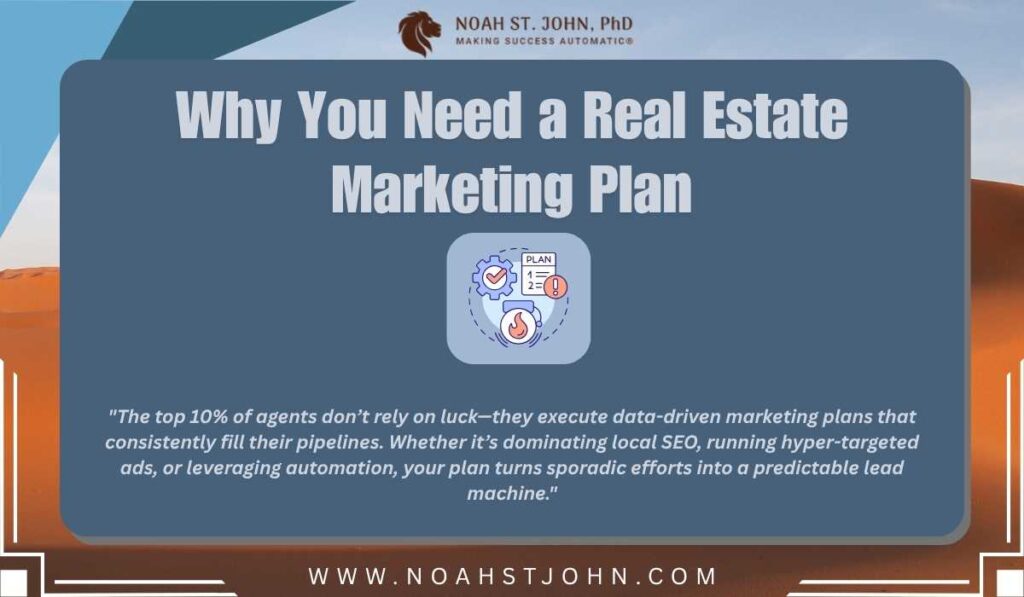
Clarity on Your Audience and Goals: You’ll define exactly who you’re targeting—whether it's first-time buyers, luxury clients, or investors—and what you want to achieve. That clarity helps you craft the right message and choose the best channels to reach them.
Consistency in Your Messaging: A plan keeps your brand message and visuals aligned across every platform—your website, social media, emails, and more. This builds trust and keeps you top-of-mind with prospects.
Confidence to Attract and Convert Leads: When you follow a clear strategy, you’ll know what works, what doesn’t, and how to improve. This gives you the confidence to consistently generate and convert leads.
Control Over Time, Budget, and Results: You’ll stop wasting time and money on scattered tactics. A plan helps you use your resources efficiently and focus on what drives real results.
Without a Plan, You’re Just Reacting: Without a strategy, you’re guessing—and that’s when opportunities slip through the cracks. A marketing plan puts you in control, so you can execute with purpose and grow with confidence.
Your marketing efforts will only be effective if you understand who you're speaking to. Defining your target audience ensures your content, advertising, and sales approach resonate with the people most likely to hire you.
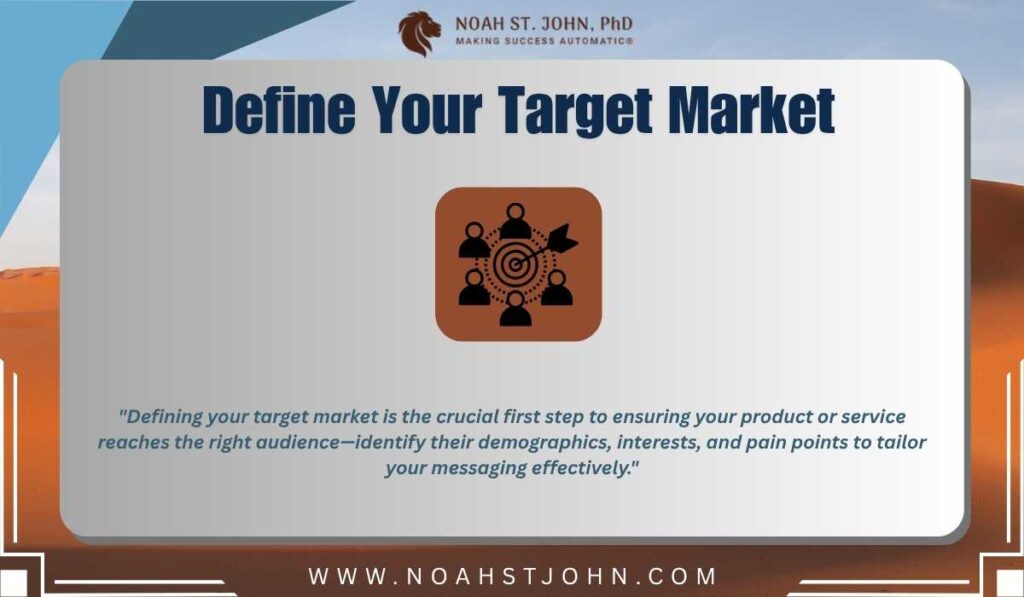
Consider these characteristics:
Knowing your niche allows you to tailor your brand and message to their unique goals, pain points, and desires—dramatically increasing your chances of converting them into clients.
Setting goals gives your marketing strategy focus and direction. Without clear goals, you’ll waste time on tactics that don’t deliver results.
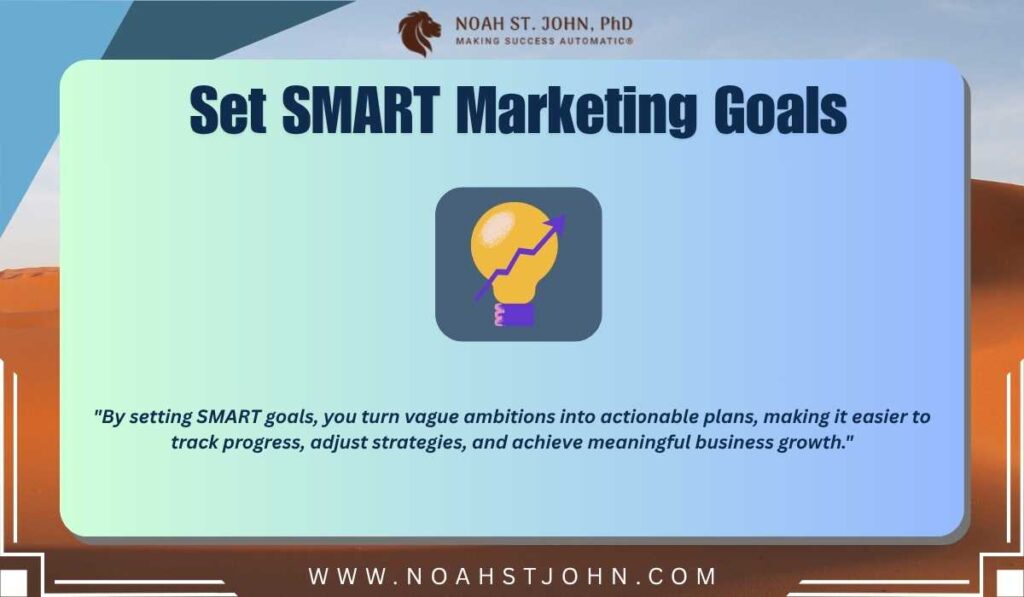
Use the SMART goal framework:
Example: “Generate 50 new buyer leads from Facebook Ads within 90 days” is clear, focused, and actionable.
This level of detail also helps you evaluate success and make data-driven adjustments over time.
Your brand is your reputation in the market. It tells prospects who you are, what you do, and why they should trust you—before they ever speak to you.

Elements of a strong brand include:
Reinforce your brand across your website, social media, email campaigns, and print materials.
And remember: strong branding isn’t just about looks—it’s about positioning yourself as the expert they need.
Today’s buyers and sellers search online first—so your digital presence is critical.
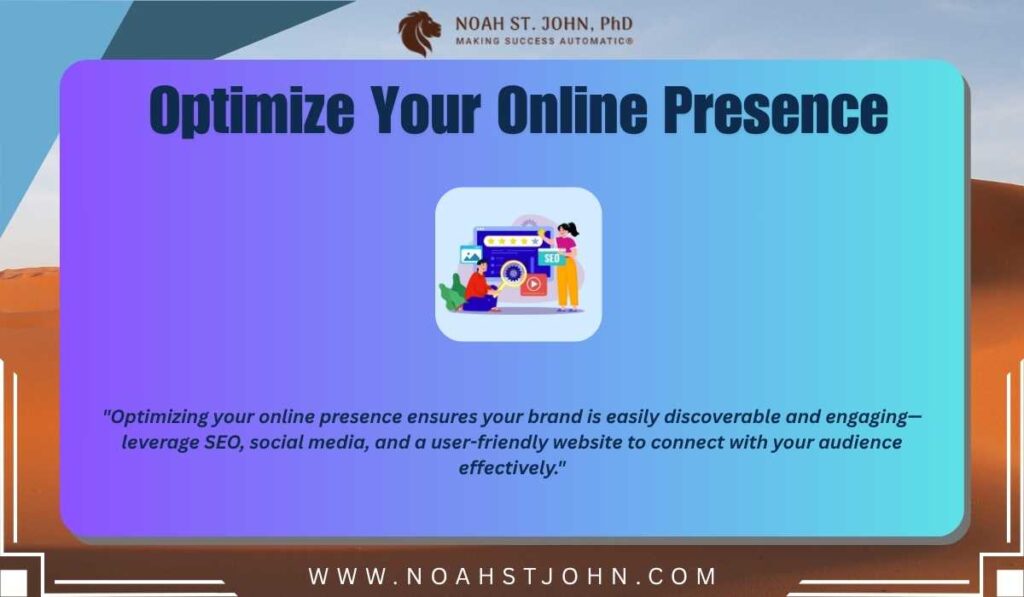
Make sure you have:
If someone Googles “top real estate agent in [your city],” will you show up? If not, start here.
Want to boost your confidence and consistency in building your online brand? The mindset and performance principles behind Power Habits® For Real Estate Professionals can help you break through visibility and productivity plateaus.
Content marketing builds trust over time and helps position you as the go-to real estate expert in your area.
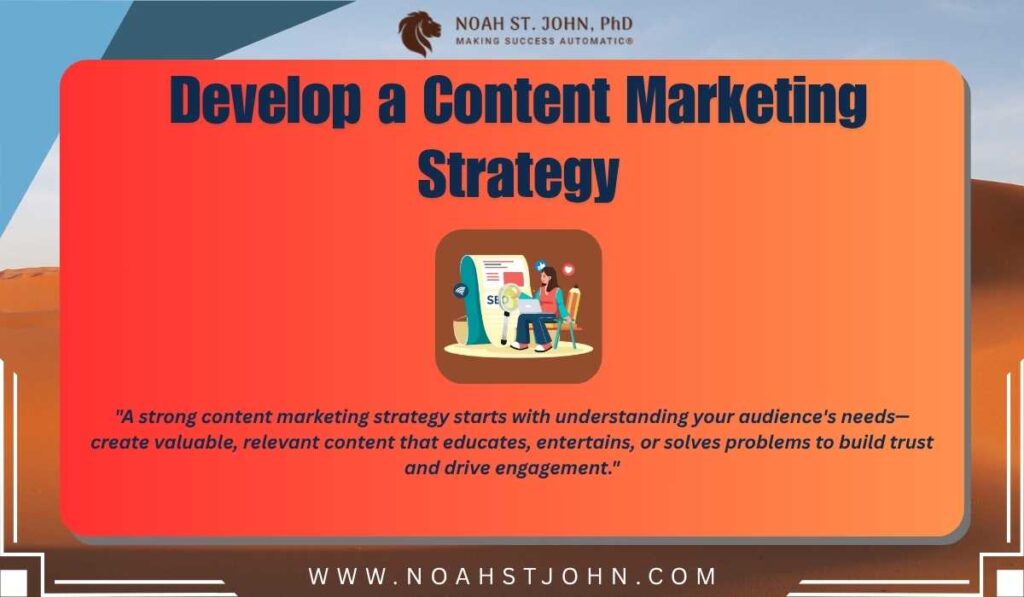
Consider creating:
Consistency is key—whether you post weekly, biweekly, or monthly, keep delivering value that educates and inspires your audience.
Need faster results? Paid ads on platforms like Facebook, Instagram, and Google can drive targeted traffic to your listings or lead magnets.

Best practices:
Monitor campaign performance by tracking cost per lead, click-through rates, and conversions—then optimize accordingly.
Many leads won't be ready to buy or sell immediately. But with a system in place, you can stay top of mind until they are.
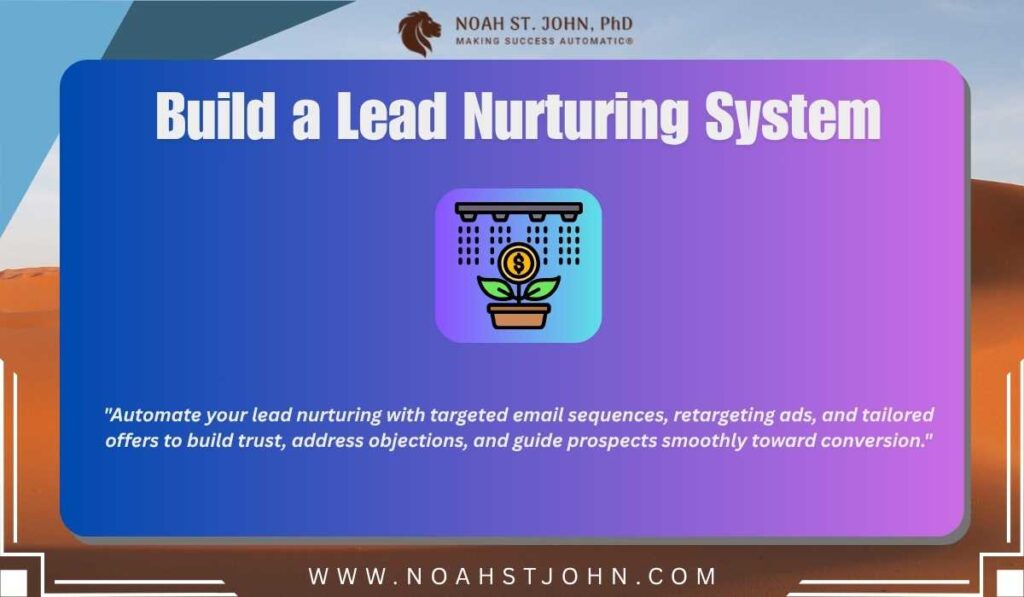
A complete lead nurturing system should include:
Over time, leads who feel educated and understood are more likely to turn into committed clients.
For a deeper understanding of high-performance systems and daily habits that drive consistent results, check out Power Habits® For Real Estate Professionals.
Prospective clients want proof that you’ve delivered real results. Social proof builds instant trust and credibility.

What to collect:
Don’t just keep them on a testimonials page—use them in your email signature, ads, landing pages, and listing presentations.
The most successful agents treat marketing like a science—track, test, and tweak.
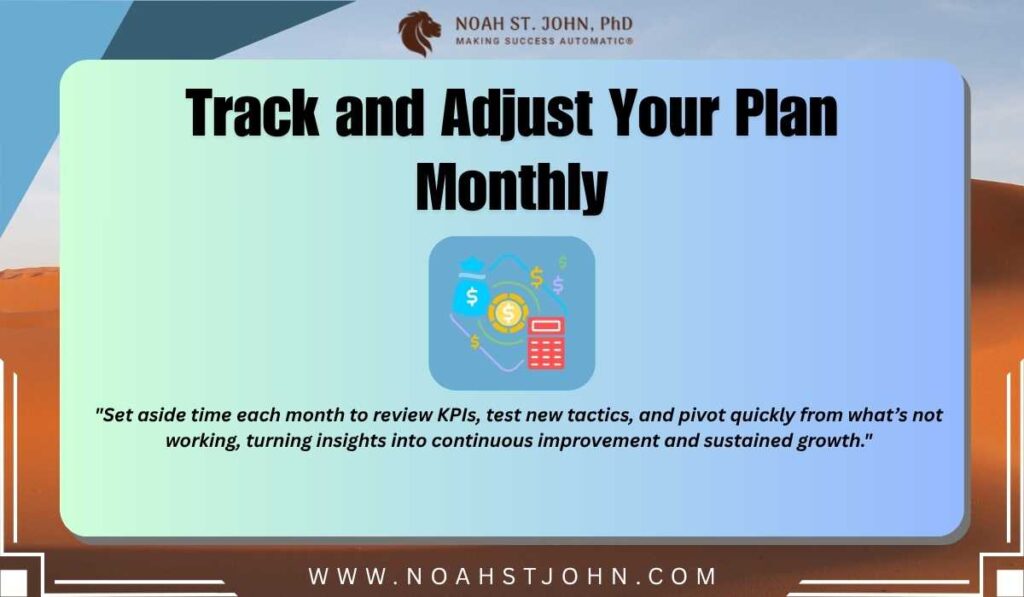
Metrics to monitor:
Set aside time at the end of each month to review your numbers, assess your wins and losses, and adjust your strategy for the next 30 days.
Even the most detailed marketing plan can fall short if your mindset, focus, or daily habits aren’t aligned with your goals.

Dr. Noah St. John’s Power Habits® For Real Estate Professionals helps agents overcome mental blocks, install empowering routines, and activate strategies that produce real results—without burnout.
This transformational program helps real estate entrepreneurs:
If you’re serious about leveling up your real estate business, mentorship from Dr. St. John could be the most valuable investment you make.
What should a real estate marketing plan include?
A real estate marketing plan should include your target audience, branding, online and offline strategies, content marketing, advertising channels, nurturing system, and monthly review process. It’s both a strategic document and a roadmap to your business goals.
How often should I update my real estate marketing plan?
At a minimum, review your marketing plan every quarter. Update it when market conditions change, you launch new services, or when your metrics show underperformance in a certain area.
Is hiring a real estate mentor part of a marketing plan?
Yes—mentorship can dramatically impact how you implement and adapt your marketing strategies. A mentor like Dr. Noah St. John helps you align your mindset, sharpen your execution, and adopt best practices that yield faster results.
Can I succeed with just free marketing methods?
Free methods (like SEO, social media, and referrals) can be powerful, but they take time. A balanced real estate marketing plan usually combines free and paid strategies for short- and long-term results.
What’s the biggest mistake agents make in their marketing plan?
The biggest mistake is not having a plan at all. Many agents jump from one tactic to another without clear goals or tracking. The second biggest mistake is failing to follow through consistently.
Your real estate marketing plan is more than just a checklist—it’s your blueprint for predictable growth and long-term success. Each component, from defining your audience to executing paid ads and nurturing leads, works together to build a sustainable business that thrives in any market.
But strategies alone aren't enough. Without the right mindset, accountability, and daily habits, even the best marketing plan can fall flat. That’s why so many top-performing agents turn to coaching—not just to learn what to do, but to stay consistent and follow through.Hiring a mentor like Dr. Noah St. John isn’t just about marketing help—it’s about becoming the kind of real estate professional who attracts clients effortlessly and closes deals with confidence. With his unique system, Power Habits® For Real Estate Professionals, you’ll learn how to master the inner and outer game of success.

Dr. Noah St. John, The Father of AFFORMATIONS®
Creator of Power Habits® for Real Estate Professionals
